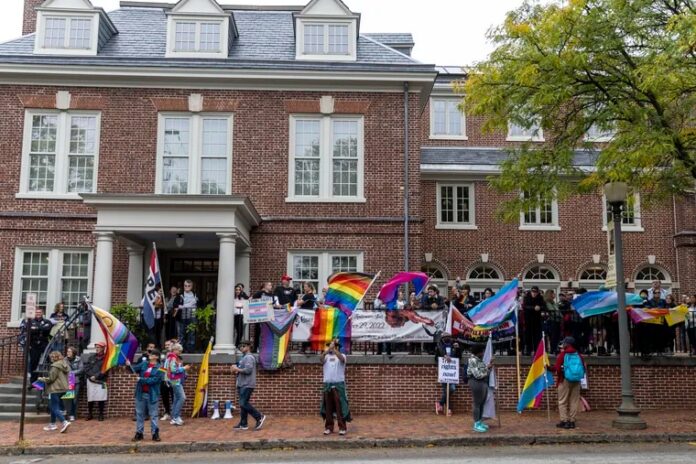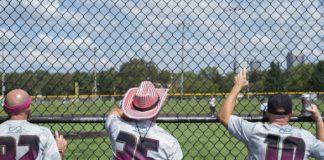/cloudfront-us-east-1.images.arcpublishing.com/pmn/A3YZPTBPM5BEHF4C2O5J55TNEQ.jpg)
Katrina Nolan likely wouldn’t have brought her 3-year-old daughter, Juliet, to an LGBTQ pride event in Philadelphia.
It would be a hassle to haul a toddler downtown from her home in West Chester.
When the 42-year-old heard the Chester County borough was holding its first OutFest — in spite of what officials called “vitriolic” opposition — she did not hesitate. She and her friends held a sign-making party, then took to the streets Oct. 1. Wearing a shirt that read “Equality,” with the “U” etched as a rainbow, Juliet grasped her mother with one hand and waved two pride flags with the other.
“It doesn’t matter how old or young the kids are. They should be exposed to diversity of all types,” Nolan said. “It’s really important to have these events in all communities, because there aren’t just LGBTQ+ people in cities.”
In recent years, an increasing number of LGBTQ events — including Pride festivals in June and celebrations for National Coming Out Day on Oct.11 — have been held in the region’s suburban and even exurban communities. And every year, organizers say, attendance grows.
It’s a trend they say is critical to increasing visibility of LGBTQ people, which in turn can lead to greater acceptance in the broader community.
For decades, the LGBTQ community “was only really public in certain places, such as the Gayborhood in Philly, Boystown in Chicago,” said Eddy Foster, 35, who organized West Chester’s OutFest. “There weren’t gay bars, or even a gay night, or LGBT events that were widespread in a place like West Chester, in a place like Norristown, in a place like Media, until the last couple decades. Now, that’s common.”
Foster and others said they attribute this in part to increasing support of LGBTQ rights across all age groups, but particularly among millennials — some of whom are now parents raising kids in the suburbs — and younger generations.
» READ MORE: Philly has never had an openly LGBTQ City Council member. That could change after next year’s election.
Earlier this month, with a week’s planning and under threatening skies, West Chester OutFest drew 500 people.
In June, thousands packed into a minor-league baseball stadium for the Lancaster Pride Festival, organizers said. In nearby Lititz, which has a population of less than 10,000 people, about 1,000 showed up to its second Pride Festival, according to organizers, and the first York County Pride drew about 1,500 supporters.
In Phoenixville, 1,000 people celebrated Chester County’s fifth PrideFest. Hundreds showed up to Haddon Township’s second pride parade, and hundreds more attended Upper Darby’s second Pride Festival.
“Growing up as a young queer person, there weren’t [accepting] spaces here,” said Elijah Neal, 21, an Upper Darby native who helped organize festivals there. “Instead of having to go into Philadelphia to experience their own Pride, they need to have their own Pride here in their own town.”
Carrie Stare recalls being the only openly gay person at her York County high school in the mid-2000s.
Now 33 and president of the LGBT Equality Alliance of Chester County, Stare said that memory fuels her desire to increase visibility in the suburbs and ensure others don’t have the same isolating experience.
“It’s so important for kids to understand that … when they are ready [to come out], there is a community that’s going to be there to support them,” she said.
There is comfort, organizers noted, in seeing that you are embraced by those in your own community instead of one miles away.
“I’ve had so many kids come up to me to say, `I’ve never felt so safe’ and ‘I’ve never felt so not judged for who I am,’” said Tesla Taliaferro, 33, president of the Rainbow Rose Center, which hosts York County Pride.
At a National Coming Out Day event in Lititz on Oct. 2, a 14-year-old who is trans spoke about receiving pushback for wanting to play on a high school sports team that corresponds with gender identity, said Parker Webb, president and cofounder of Lititz Chooses Love.
» READ MORE: Penn swimmer Lia Thomas’ success has prompted national debate about trans athletes. Here’s what to know.
Webb, a 40-year-old trans man, said he has also heard several young people speak about LGBTQ friends who died by suicide.
His voice catches as he recounts those stories.
“If anything, it gives me that feeling of ‘Why haven’t I gotten further yet?’” Webb said. “We need more resources. We need more support.”
But he said he finds hope, too, in the number of parents who reach out to Lititz Chooses Love, asking how to talk with their LGBTQ children.
Many parents are supportive, despite having been raised in households that would not have been, he said. They simply haven’t been exposed to many openly LGBTQ people, he said, and weren’t educated about topics such as sexuality and gender identity.
“They need a safe space to ask these questions that they have,” Webb said.
At York’s Rainbow Rose Center, a volunteer group that hosts events and connects people with other LGBTQ services, young people ask about resources for themselves, as do doctors seeking information for patients.
Organizers said they hope these conversations lead to broader inclusivity.
“So many people in our community for generations have fled our suburban or rural areas in hopes they can live safely and anonymously in bigger cities that are more affirming,” said Taliaferro. LGBTQ organizers want that to stop.
Despite recent strides, the hateful emails that West Chester officials received during the planning of OutFest are a reminder that progress is still “very fragile,” Foster said.
About a dozen protesters showed up to the revamped event, he said.
“There are a few people here with some loud megaphones,” Foster said. “The LGBT community was there with 500. If that was an election, that’d be a landslide.”
Similarly sized groups of protesters have stood outside other LGBTQ events, but none of the organizers who spoke with The Inquirer reported threats of physical violence. Some said they had noticed more pre-event pushback, especially if events include drag performers, who have become a target of conservatives and far-right extremist groups. None said they had to cancel events.
Hate can have a unifying effect, some organizers said, prompting LGBTQ allies who were only passively supportive to attend events or become more involved.
Organizers said they hope increased visibility leads to fewer people with anti-LGBT views.
“When you know there’s a trans kid down the street and they’re not a monster … that leads to more acceptance,” said Micki Dawson, president of Lancaster Pride and a 24-year-old trans man.
“It’s a lot harder to hate what you know,” Foster said, “than it is to hate that abstract thing you don’t know.”







